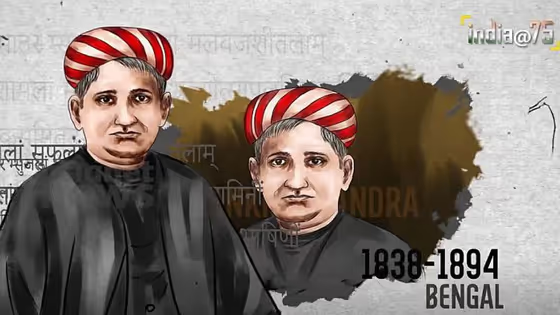
India@75: Bankim Chandra Chattopadhyay, the man whose works awoke a nation
Bankim Chandra Chattopadhyay was among the pioneering writers who shaped India's national consciousness
Various literary works had played a crucial role in the awakening of Indian citizens' self-respect and resistance against foreign dominance. One of the pioneering writers, who shaped the formation of India's national consciousness was Bankim Chandra Chattopadhyay.

Bankim Chandra and his celebrated novel Ananadamutt were at the forefront of the modern Bengali literary resurgence. They also inspired the Bengal Renaissance as well as the nationalist upsurge. The legendary Sanyasi Fakir Revolt that rose against the British during the 18th century was the theme of Anandmutt published in 1882. The famed Vande Mataram that later became Indian Republic's National Song appeared in Anandamutt.
Poet Ravindranath Tagore was its composer. Vande Mataram, which celebrates all aspects of India's physical and spiritual dimensions provided great inspiration and self-respect for the nationalist movement.
Born in 1838 at the 24 Parganas, Bankim was among the earliest graduates of Calcutta University. Having graduated in law, he became the district magistrate at Jessore. Bankim's literary career began in the world of poetry.
A friend of Sree Ramakrishna Paramhansa, his works became a spokesperson of the rising national consciousness. 'Durgesh Nandini', 'Kapal Kundala', etc were among his other novels. His 'Rajmohan's Wife' is the first Indo-Anglian novel.
Sympathetic to militant nationalism, he was the inspiration for the militant nationalists like Aurobindo Ghosh. His work 'Anusheelan Tatva' gave birth to the extremist nationalist party Anusheelan Samiti set up by Pramathanath Mitra to which most Bengali revolutionaries of the early 20th century belonged.
Tagore called him a Sabyasachi for his versatility. Yet, Bankim Chandra's politics, philosophy and works, including Vande Mataram, are accused of celebrating Hindu revivalism. They are criticised for being anti-Muslim too.
It was taking the Muslim opposition that the Calcutta session of the Indian National Congress held in 1937 decided to exclude some stanzas of Vande Mataram when it was sung.